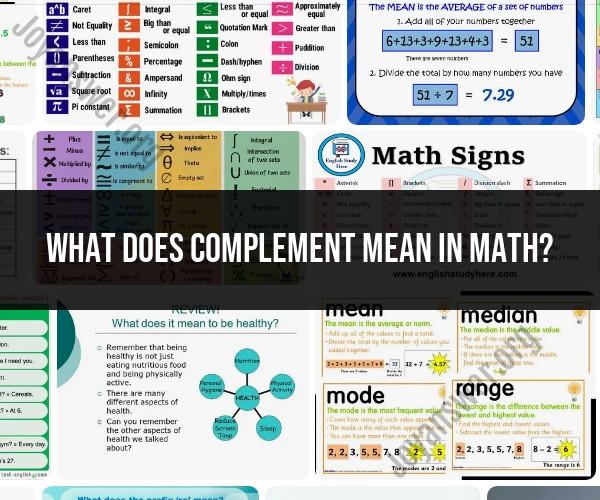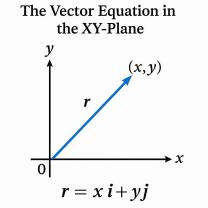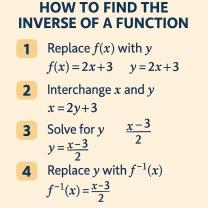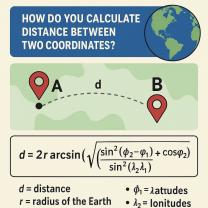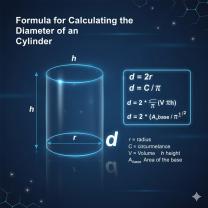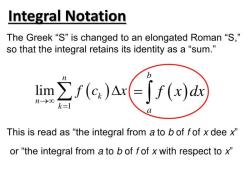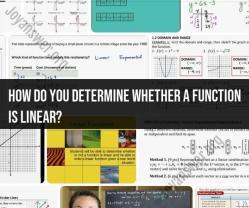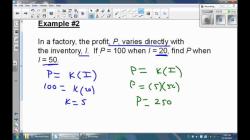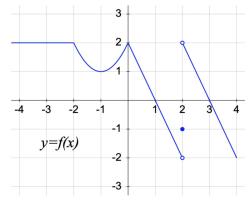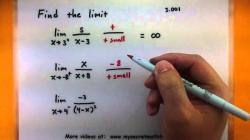What does complement mean in math?
In mathematics, the term "complement" has different meanings depending on the context in which it is used. Here are the primary meanings of "complement" in math:
Set Theory:
In set theory, the complement of a set refers to the elements that are not in the set but are part of the universal set under consideration. Symbolically, if A is a set and U is the universal set, the complement of A, denoted as A', is defined as:
A' = {x ∈ U : x ∉ A}
In words, the complement of set A contains all elements that belong to the universal set U but do not belong to set A.
Geometry:
In geometry, the term "complement" is often used to describe angles. Two angles are considered complementary if their measures add up to 90 degrees (or π/2 radians). In other words, if angle A and angle B are complementary, it means:
A + B = 90 degrees or π/2 radians
Complementary angles are frequently encountered in geometry problems involving right angles and trigonometry.
Probability:
In probability theory, the complement of an event refers to the set of outcomes that do not satisfy the event. For example, if event A represents the event of drawing a red card from a deck of playing cards, then the complement of event A represents the event of drawing a card that is not red (i.e., black cards). The probability of the complement of an event is often used to calculate the probability of the event not occurring.
Number Theory:
In number theory, the complement of a divisor or factor of a number refers to another divisor that, when multiplied by the original divisor, results in the number itself. For example, for the number 12, the complement of the divisor 3 is 4 because 3 × 4 = 12.
The specific meaning of "complement" in mathematics can vary depending on the mathematical area and the context in which it is used. It often represents elements or quantities that are somehow related to, or complete the set, angle, event, or divisor under consideration.
Complement in Math: Understanding the Concept
The complement of a set A is the collection of all elements that are not in A. In other words, the complement of A is the set of elements that belong to the universal set, but not to A.
The complement of a set A is denoted by A'. For example, if the universal set is U = {1, 2, 3, 4, 5} and A = {1, 2, 3}, then the complement of A is A' = {4, 5}.
Math Terminology: Defining "Complement"
The complement of a set is a fundamental concept in mathematics. It is used in many different areas of mathematics, including set theory, logic, probability, and statistics.
The complement of a set can be defined in two ways:
- Negation: The complement of a set A is the negation of A. The negation of A is the set of elements that do not belong to A.
- Difference: The complement of a set A is the difference between the universal set and A. The difference between two sets A and B is the set of elements that belong to A but not to B.
Complement in Mathematical Operations: Insights and Examples
The complement of a set can be used in a variety of mathematical operations. For example:
- Union: The union of two sets A and B is the set of elements that belong to either A or B or both A and B. The complement of the union of A and B is the set of elements that belong to neither A nor B.
- Intersection: The intersection of two sets A and B is the set of elements that belong to both A and B. The complement of the intersection of A and B is the set of elements that belong to either A or B but not both A and B.
- Difference: The difference between two sets A and B is the set of elements that belong to A but not to B. The complement of the difference between A and B is the set of elements that belong to either A or B or both A and B.
Here are some examples of how to use the complement of a set in mathematical operations:
- Example 1: Find the complement of the set A = {1, 2, 3} in the universal set U = {1, 2, 3, 4, 5}.
The complement of A is A' = {4, 5}.
- Example 2: Find the union of the sets A = {1, 2, 3} and B = {4, 5} and then find the complement of the union.
The union of A and B is A U B = {1, 2, 3, 4, 5}. The complement of A U B is (A U B)' = {}.
- Example 3: Find the intersection of the sets A = {1, 2, 3} and B = {4, 5} and then find the complement of the intersection.
The intersection of A and B is A ∩ B = {}. The complement of A ∩ B is (A ∩ B)' = {1, 2, 3, 4, 5}.
The complement of a set is a powerful tool that can be used to solve a variety of mathematical problems. By understanding how to use the complement of a set, you can expand your mathematical knowledge and solve more complex problems.
